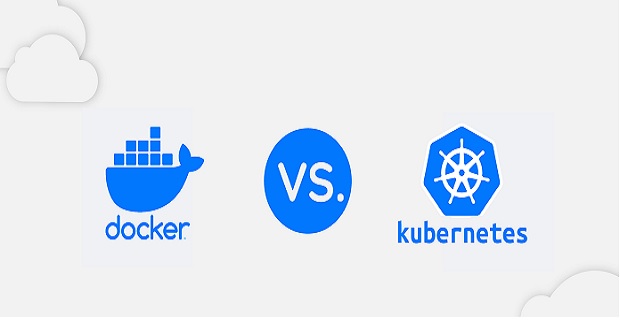Kubernetes vs. Docker: Navigating the Pros, Cons, and Ideal Use Cases

Introduction
Kubernetes and Docker have emerged as two heavyweight contenders in modern application deployment and management. They are pivotal in shaping the landscape of containerization and orchestrating applications at scale. However, the confusion between Kubernetes and Docker often leads to questions about their roles, benefits, and limitations. This article will explore the nuanced comparison between Kubernetes and Docker, exploring their pros, cons, and optimal use cases.
Understanding Docker and Kubernetes
Before diving into the comparison, it’s essential to understand the fundamentals of Docker and Kubernetes. Docker is a platform that allows developers’ applications and their dependencies into a standardized unit known as a container. Containers provide isolation, enabling applications to run consistently across various environments.
On the other hand, Kubernetes is an open-source container orchestration platform that automates containerized applications’ deployment, scaling, and management. It simplifies managing many containers by providing tools for load balancing, automatic scaling, and self-healing.
Pros and Cons of Docker
Pros:
- Portability: Docker containers encapsulate applications and their dependencies, ensuring consistency across different environments. This portability minimizes the “it works on my machine” problem and facilitates seamless deployment.
- Efficiency: Containers share the host OS kernel, consuming fewer resources than traditional virtual machines. This efficiency allows for higher density and better resource utilization on servers.
- Rapid Deployment: Docker’s lightweight nature enables swift application deployment. Developers can quickly create, test, and deploy containers, fostering a faster development cycle.
- Version Control: Docker containers can be versioned, enabling teams to maintain different versions of applications simultaneously. This simplifies rollbacks and makes collaboration more manageable.
Cons:
- Limited Orchestration: While Docker offers basic orchestration capabilities, it reduces the advanced features of a dedicated orchestrator like Kubernetes. Complex applications may require more advanced orchestration features.
- Scalability Challenges: Docker needs to have built-in auto-scaling mechanisms. Manual intervention or third-party tools may be necessary to scale applications, leading to complexities in managing large-scale deployments.
- Networking Complexity: Networking between Docker containers and external resources can be intricate, especially in multi-host environments. This complexity can hinder straightforward communication and connectivity.
Pros and Cons of Kubernetes
Pros:
- Robust Orchestration: Kubernetes excels in orchestrating complex applications. It offers automated scaling, load balancing, rolling updates, and self-healing, simplifying the management of containerized applications.
- Auto-scaling: Kubernetes provides native support for auto-scaling based on resource utilization or custom metrics. This dynamic scaling ensures optimal performance during varying workloads.
- High Availability: Kubernetes supports the distribution of applications across multiple nodes, ensuring high availability. If a node fails, Kubernetes automatically shifts the workload to healthy nodes.
- Service Discovery: Kubernetes offers built-in service discovery and load balancing, facilitating efficient communication between microservices in a cluster.
Cons:
- Learning Curve: Kubernetes has a higher learning curve than Docker due to its extensive feature set and complexity. New users require significant time to grasp its concepts fully.
- Resource Intensive: Setting up and maintaining a Kubernetes cluster demands substantial resources. This overhead might not be suitable for smaller projects or organizations with limited infrastructure.
- Complex Configuration: The extensive configuration options in Kubernetes can be overwhelming. Incorrect configurations can lead to unexpected behavior or security vulnerabilities.
Ideal Use Cases
Docker Use Cases:
- Developer Environments: Docker’s portability makes it ideal for creating consistent team development environments.
- Microservices: Docker containers are well-suited for deploying and managing microservices architecture, where applications are broken down into smaller, independent components.
- CI/CD Pipelines: Docker containers streamline continuous integration and continuous delivery processes, ensuring consistent builds across different stages of development.
Kubernetes Use Cases:
- Scalable Applications: Kubernetes shines when managing large-scale applications that require automated scaling, load balancing, and high availability.
- Complex Workloads: Applications with intricate networking requirements, microservices architecture, and advanced deployment strategies benefit from Kubernetes’ robust orchestration capabilities.
- Hybrid and Multi-Cloud Deployments: Kubernetes simplifies deploying applications across various cloud providers and on-premises infrastructure, offering consistent management and abstraction.
Conclusion
In the Kubernetes vs. Docker showdown, both technologies play crucial roles in containerization and application deployment. Docker excels in creating lightweight, portable containers, ideal for individual development environments and microservices. On the other hand, Kubernetes takes center stage for orchestrating complex applications at scale, offering advanced features like auto-scaling, service discovery, and high availability.
Understanding the advantage and disadvantages of each technology is essential for making informed decisions in the ever-evolving landscape of application deployment. Depending on the project’s requirements, one can leverage Docker’s simplicity or Kubernetes’ powerful orchestration capabilities to propel applications toward success.




